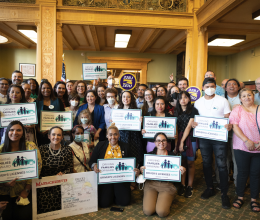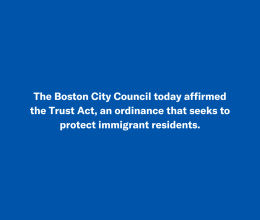
Chief Judge Patti B. Saris last night ruled that ACLU of Massachusetts and Foley Hoag client Samuel Pensamiento’s due process rights were violated when he was held for three months without the government every having to prove that his detention was necessary.
Mr. Pensamiento was detained on January 31, 2018 at the Chelsea District Court. He was denied bond after a proceeding in which he was made to prove by clear and convincing evidence that he would not pose a danger or flight risk.
In an earlier part of this proceeding, federal judge Allison D. Burroughs ordered that Mr. Pensamiento be permitted to attend court in in Chelsea in order to resolve his misdemeanor charges. After a hearing on his unlawful detention claims in April, Mr. Pensamiento was released in time for the birth of his son.
Last night, Chief Judge Saris has ruled that Mr. Pensamiento must remain free unless the government provides him with a bond hearing at which the government must prove that his detention is necessary.
ACLU of Massachusetts staff attorney Adriana Lafaille today released the following statement in response to the decision:
“Too many people like Mr. Pensamiento are detained without receiving the basic element of due process: a fair and adequate bond hearing to determine whether their detention is even necessary. Mr. Pensamiento and his family suffered three long months of needless separation. Today’s ruling vindicates the important constitutional principle that freedom is the norm, and detention is the exception that should be used only when necessary.”
Daniel McFadden of Foley Hoag, lead counsel on the case today released the following statement in response to the decision:
“We are very pleased with the Court’s decision. Our Constitution embodies the fundamental principle that the government cannot deprive any person of his or her liberty without making a strong showing that imprisonment is necessary. For nearly two decades, the Immigration Courts have turned that principle on its head in civil immigration proceedings. The Court today has ruled that the government cannot jail immigrants like Mr. Pensamiento without showing an Immigration Judge that there is a very good reason. Mr. Pensamiento spent almost three months in the Plymouth County Correctional Facility. We are very pleased that he is now released and will receive the due process required by our Constitution. Mr. Pensamiento is married to a U.S. citizen, has a U.S. citizen child, and has multiple pathways to lawfully remain in the country. We have high hopes for his future in the United States.”





